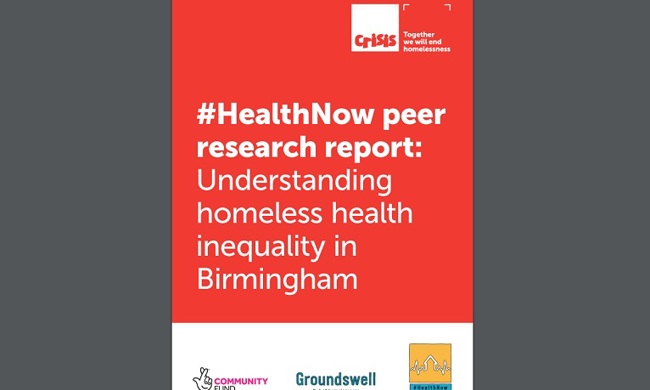Understanding homeless health inequality in Birmingham (2021)
19.03.2021
#HealthNow peer research report: Understanding homeless health inequality in Birmingham (2021)
Between September and November 2020, six peer researchers from Crisis Skylight Birmingham in partnership with Groundswell carried out 64 semi-structured interviews with people experiencing homelessness in Birmingham. This peer-led research provides empirical evidence illustrating the issues people experiencing homelessness face when accessing healthcare services and maintaining their own health and wellbeing. The key themes identified were:
Key findings:
- Challenges when accessing various primary care and secondary care services: People described significant barriers to accessing healthcare services. This was often due to challenges with registration (especially with GPs and dentists), inflexible appointment booking systems and long waiting periods to get the support that they needed.
- Positive experiences of using pharmacies: People praised their experiences of using pharmacies which were largely described as flexible, friendly and informative.
- Long waiting times for mental health support and limited follow up support: People often felt that the mental health support they received was not timely enough, too limited and lacked follow-up support.
- Difficulties with clear and consistent communication: People told us about poor and inconsistent communication between health services and patients which often led to a lack of clarity about appointments and treatment. This was especially an issue for people whose care had changed due to the pandemic or were digitally excluded.
- Financial barriers to healthcare and preventative measures: People outlined several barriers to accessing healthcare that were due to a lack of money including for travel costs and phone credit. Financial barriers also impacted people’s ability to maintain their own health and wellbeing such as struggling to afford sufficient and nutritious food.
- Experiences of stigma and lack of awareness from healthcare staff: Despite some positive experiences of engaging with healthcare staff from a range of services, people also referenced the impact of the stigma faced when engaging with staff.
- Lack of interpreting services: Several people described challenges when accessing interpreting services. The limited availability of these services had a significant impact on patients. who faced increased waiting times and difficulties understanding their care and treatment.
- Patient feedback: The majority of people we heard from had not been asked for feedback or made a complaint about the healthcare services they had used, despite feeling that their experience was poor. This highlights the need for services to ensure patients have accessible ways to feedback and clear information outlining complaints and feedback processes.
- These findings will be used to inform a local homeless health action plan which will be devised by Birmingham’s #HealthNow alliance. They will also influence Groundswell's national #HealthNow campaign to inform national decision making processes.
#HealthNow is led by Groundswell and delivered in partnership with national charities Crisis and Shelter.
Reference:
Groundswell and Crisis (2021) #HealthNow peer research report: Understanding homeless health inequality in Birmingham


